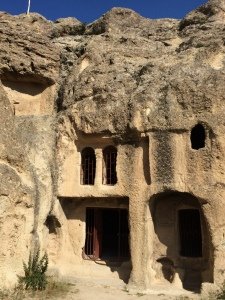Poet Priests
Mystic Mondays September 19, 2016I was talking with my website and business consultant from Wild Ginger Press this past week about the intuitive and almost impulsive decision to ride from Rome to Konya, Turkey in the fall of 2014. I was explaining how surprised I was that what I discovered on that pilgrimage is playing itself out in our churches and communities. Bobbi quickly inserted, "Oh yeah, Brian, I remember when you decided to do it and you said, 'I don't why I need to do this, but I feel like I need to ride from Rome to Rumi's Tomb in Turkey. It has something to do with the move from institutional religion to the language of mysticism.'" This conversation came up because I had a major confirmation this week. I am currently facilitating a six-week class on The History of Christianity at the church where I am serving. We are watching a wonderful DVD set that was produced by BBC and narrated by church historian Dairmaid McCulloch. In the first episode Dairmaid visited Syria to tell the story of the Orthodox churches that had thrived in the first few centuries after Christ. He was talking to a Syrian priest about the religious differences between East and West when he asked, "What is it that you think is missing in the West?" The priest from the Syrian Orthodox Church gave a very concise answer that hit me like a strike of lightning.
This conversation came up because I had a major confirmation this week. I am currently facilitating a six-week class on The History of Christianity at the church where I am serving. We are watching a wonderful DVD set that was produced by BBC and narrated by church historian Dairmaid McCulloch. In the first episode Dairmaid visited Syria to tell the story of the Orthodox churches that had thrived in the first few centuries after Christ. He was talking to a Syrian priest about the religious differences between East and West when he asked, "What is it that you think is missing in the West?" The priest from the Syrian Orthodox Church gave a very concise answer that hit me like a strike of lightning.
"In the West your theologians are philosophers. In the East our theologians are poets and iconographers (artists)."
I knew immediately that what my head could not tell me my soul had already known. I had cycled from Catholic Italy, through Orthodox Greece, and into Muslim Turkey in search of a spirituality, a religious tradition that more closely mirrored the reality of my soul.Every pastor in the Presbyterian tradition has to write a statement of faith as part of the ordination trials for entrance into the profession. My earliest statements of faith relied on good theological philosophy. There was a rationality to them even in attempting to explain the relationship between God, Jesus and Spirit (as if the Trinity could be rationally explained!). I made logical connections and used the "If this is so, that must be so..." types of arguments.But in 2005 I threw out my old statements of faith. They bored me. They were air-tight rational explanations, but they didn't make my heart sing. I no longer thought about God through the powers of my mind, but experienced God through the softness of my heart. God was no longer to be explained, but to be experienced. I rewrote my statement of faith as poetry. Here is the first stanza:
In the beginning was the Word…pulsating, thriving, exploding;a world birthed, a world coming into being,rocks and seas and blossoming trees,the winged, the legged, and the scaledanimating and revealing the divine artistry of her Maker.
 I am struck by the Syrian priest's comment and my come-to-Jesus revelation that the distinct difference between theologians of the West and the East is the difference one gets when one approaches religion through the lens of philosophy compared to poetry and the arts. It was the poetry of Rumi that first drew me to Turkey although I literally had only read a dozen or fewer of his poems. I just knew that my soul wanted more.I wonder if the philosopher theologian is no longer as satisfying to today's people as it is to me. We can describe God. We can elucidate on the exact relationship between Jesus and God. We can draw lines that connect divine entities and boxes that contain all the various descriptions of God. But even if we get it all right, even if our definitions are picture perfect will that be enough to satisfy the hungry soul? Will that be enough to heal the hurting heart? Will that be enough to quench the thirst of the spiritually yearning?The pastor as poet? The priest as artist? The minister as musician?Do our Syrian Orthodox friends know something we don't?
I am struck by the Syrian priest's comment and my come-to-Jesus revelation that the distinct difference between theologians of the West and the East is the difference one gets when one approaches religion through the lens of philosophy compared to poetry and the arts. It was the poetry of Rumi that first drew me to Turkey although I literally had only read a dozen or fewer of his poems. I just knew that my soul wanted more.I wonder if the philosopher theologian is no longer as satisfying to today's people as it is to me. We can describe God. We can elucidate on the exact relationship between Jesus and God. We can draw lines that connect divine entities and boxes that contain all the various descriptions of God. But even if we get it all right, even if our definitions are picture perfect will that be enough to satisfy the hungry soul? Will that be enough to heal the hurting heart? Will that be enough to quench the thirst of the spiritually yearning?The pastor as poet? The priest as artist? The minister as musician?Do our Syrian Orthodox friends know something we don't?
